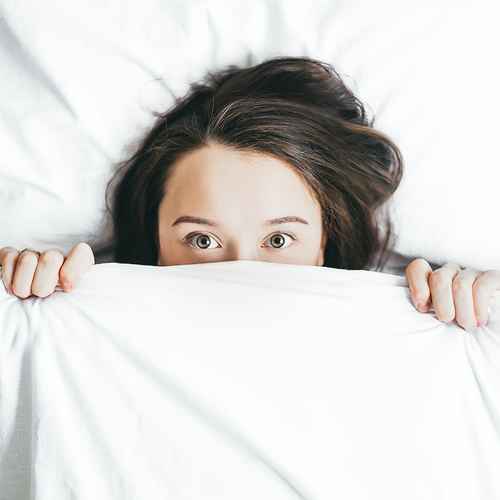The Real Reasons You're Not Sleeping Properly

The Real Reasons You’re Not Sleeping Properly
You know that perfectly rested feeling you get after a good night’s sleep? Have you noticed in contrast how awful you feel after a terrible night’s sleep? How about after multiple nights of terrible sleep? Adequate rest and sleep are paramount to your good
health and, at the core, to basic survival.
Sleep Quality Matters
The quality of your sleep affects your attention span, your cognitive acuity and even your mood. That means that your ability to think clearly, regulate your emotions, and find joy in life is directly linked to how well you are sleeping at night. And it’s not only your brain that’s affected, your body has many functions that rely on you getting regular deep sleep on a physiological level. Inadequate sleep can interrupt detoxing functions, disrupt hormones and contribute to a roster of health problems.
The quality of your sleep affects:
● Cognitive function
● Cognitive speed
● Accuracy
● Performance
● Memory
● Mood
● Psychological well-being
● Interpretation of events
● Stress levels
● Hormone
● Resistance to disease
● Quality of life
Sleep Quantity Matters Too - How Many Hours Do You Sleep?
Research has taught us that the average person needs a minimum of seven hours of quality sleep per night for their physiological functions and brain to function optimally, and that needs to be happening on a regular basis. It has also shown us that not everyone is getting nearly that amount of sleep, and many people don’t realize there is a huge connection between their sleep patterns and their health.
Modern Life is Creating Sleep Deficits
Why does this happen? Why are so many people unaware of their accumulating sleep deficits? Modern work demands, the increasing rarity of work/life balance, and the emergence of ‘hustle culture’ often celebrate our ability to get much done on little sleep. We are expected to do more on less rest, and sometimes that is to the detriment of our physical and physiological health.
Despite this, there is much you can do to improve the quality of your sleep and your health.
Why Am I Not Sleeping Properly?
While having a poor night’s sleep isn’t fun for anyone, it generally isn’t a reason for
concern. We all experience it from time to time and our bodies are usually able to
bounce back the following day after a decent night’s sleep. Not sleeping well does
become an issue, however, if waking up tired every morning becomes the norm.
Insomnia
Insomnia is characterized by the inability to attain a good night’s sleep despite having
the opportunity and environment to do so, with negative next-day consequences. In
short, you sleep poorly, wake up tired or exhausted, and your next day is miserable because you don’t have the capacity to navigate it well. Insomnia is the most common sleep disorder, affecting approximately one third of all adults.
Insomnia can take three forms:
1. Transient Insomnia occurs for one week or less; is often the result of stress or
environmental factors (such as excessive noise)
2. Acute Insomnia occurs for up to one month; is often the result of stress;
dissipates once the stressor is no longer present
3. Chronic Insomnia occurs for at least three nights per week for three months or
longer; is often the result of long-term stress/anguish and/or a medical condition
Underlying Reasons You May Be Suffering From Insomnia
Stress
Despite insomnia being rather common, what causes it can differ greatly from person to person. Several factors can trigger it, with stress being one of the most common causes of insomnia whether it comes from a specific incident or ongoing stressors such as grief or work-related issues.
Trauma
Physical and/or physiological trauma caused by one or a series of events can cause chronic insomnia despite feeling as though you have moved past it. Sometimes a past traumatic experience affects us more deeply than previously thought and needs to be addressed by getting the right professional help.
Health Issues
Chronic pain, nightly sleep apnea, regular allergies, and ongoing digestive issues or acid reflux can cause discomfort, making it hard to fall asleep and stay asleep - thereby disrupting your body’s natural sleep cycles. External issues such as disruptive noise, an uncomfortable mattress or pillow, invasive light through the window or from electronics, and temperature fluctuations can contribute to the same difficulties in falling and stayingasleep. Certain medication side effects may also be factors, such as antihypertensives,
hormonal medications, respiratory medication.
Hormones
As women go through perimenopause, estrogen, progesterone, and testosterone all drop which can cause well known symptoms such as hot flashes, mood changes and fatigue. These symptoms can mean interrupted or poor quality sleep. Estrogen can affect the body’s magnesium levels, a mineral that actively helps muscles relax. As estrogen levels drop, this can lead to restless, twitchy legs at night and even muscle cramps. Men’s hormones are also affected by getting older, with lower testosterone levels being linked to similar sleep issues to those women face. When testosterone starts to drop, so do levels of feel-good neurotransmitters dopamine and serotonin, adding stress and anxiety into the mix.
Blood Glucose Levels
Fluctuating blood glucose levels and reduced insulin sensitivity become more common
as we get older, and this is all the more marked in women going through the sudden
hormonal disruptions associated with perimenopause. High blood sugar levels can
make you feel too warm or irritable and unsettled, leading to difficulty falling and staying
asleep. It is important to check your blood glucose levels regularly as you mature in
years, as the risk of developing diabetes increases. If you can’t fall asleep due to feeling
hot and bothered after dinner, talk to your healthcare practitioner about a glucose test.
Top Ways To Improve Sleep
Whatever the reasons for your insomnia, there is a lot you can do to help bring back
some balance to your body and regain a more regular, restful night’s sleep.
Good Sleep Habits
We recommend practicing good sleep hygiene to ensure lasting and restful sleep. Sleep hygiene is the accumulation of regular practices that promote great sleep where you wake up feeling refreshed every morning.
Adopt the following to get a good night’s sleep:
Bedtime Sleep Hygiene
● Create a relaxing nightly routine that works for your lifestyle and stick to it (i.e. a
warm bath or relaxing music)
● Go to bed at the same time every night
● Keep your bedroom quiet, dark and cool
● No screen time for at least one hour before bed
● Go to sleep on an empty stomach
● Don’t “try” to sleep
Daytime Sleep Hygiene
● Wake up at the same time every day
● Avoid stimulants (caffeine, nicotine) after 12:00 pm
● Limit your alcohol intake
● Avoid taking naps
● Refrain from using your bed and/or bedroom for activities such as reading,
working, or relaxing
Daily Lifestyle Habits for Optimal Sleep
1. Exercise - Enjoy a minimum of 30-minutes of moderate daily exercise
2. Supplements - Recommended for short-term use only, you can talk to your
healthcare practitioner about whether magnesium, valerian root, St. John’s Wort,
5-HTP (5-hydroxytryptophan) or melatonin are appropriate for you.
3. Guided imagery, mindfulness meditation, progressive muscle relaxation and
breathing exercises
4. Journaling
5. Cognitive Behavioural Therapy (CBT) - CBT is effective for chronic insomnia or
insomnia caused by trauma. Speak to your health practitioner to find out more.
6. Balance your hormones - hormone imbalances are common culprits when it
comes to the quality of your sleep, and the quality of your sleep affects your
hormone balance.
We Can Help
If you have given it your best effort and are still not getting the restful sleep you need, we can help. The functional model looks at underlying causes specific to you and creates a lifestyle plan to help improve the
quality of your sleeping and waking hours. Book an appointment here.
Or schedule a complimentary discovery call here.

